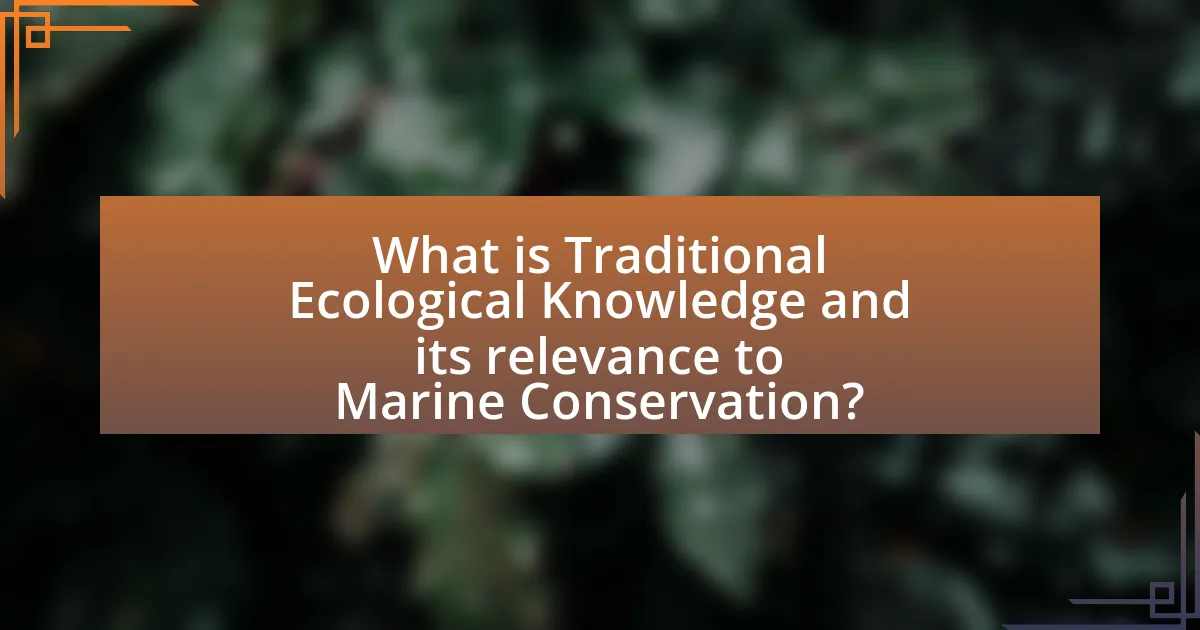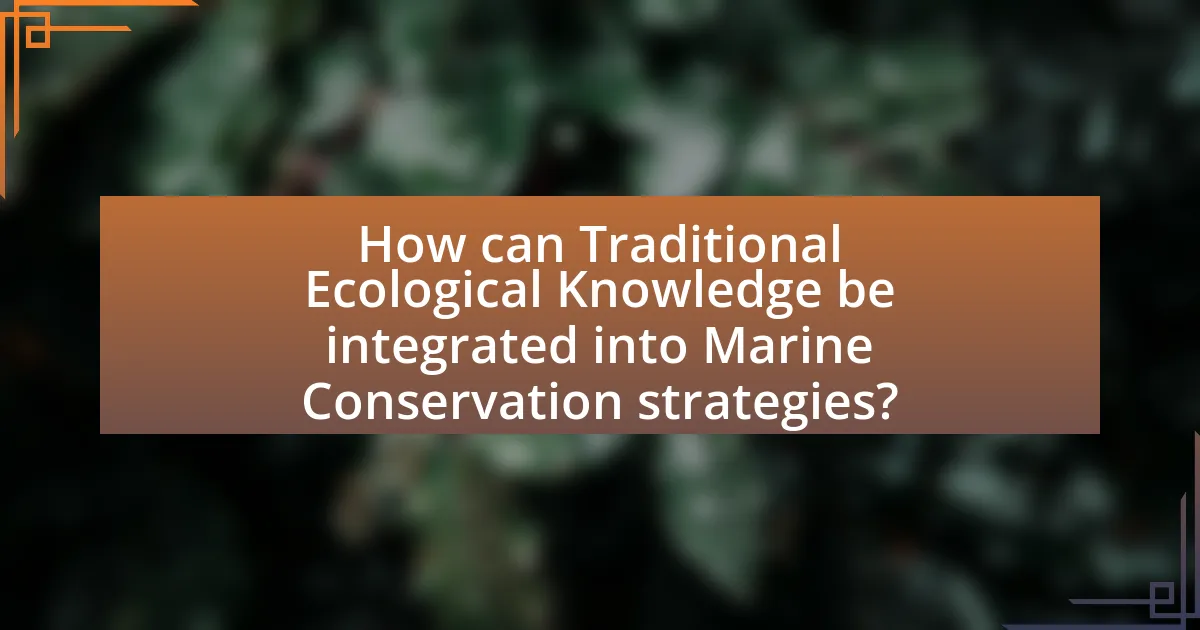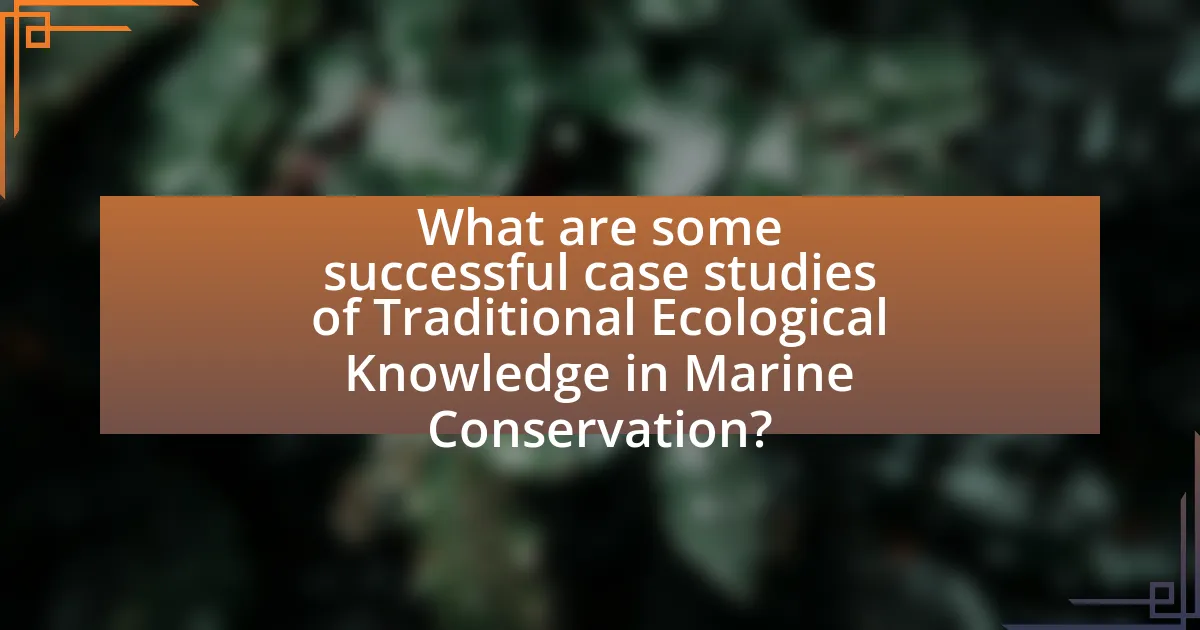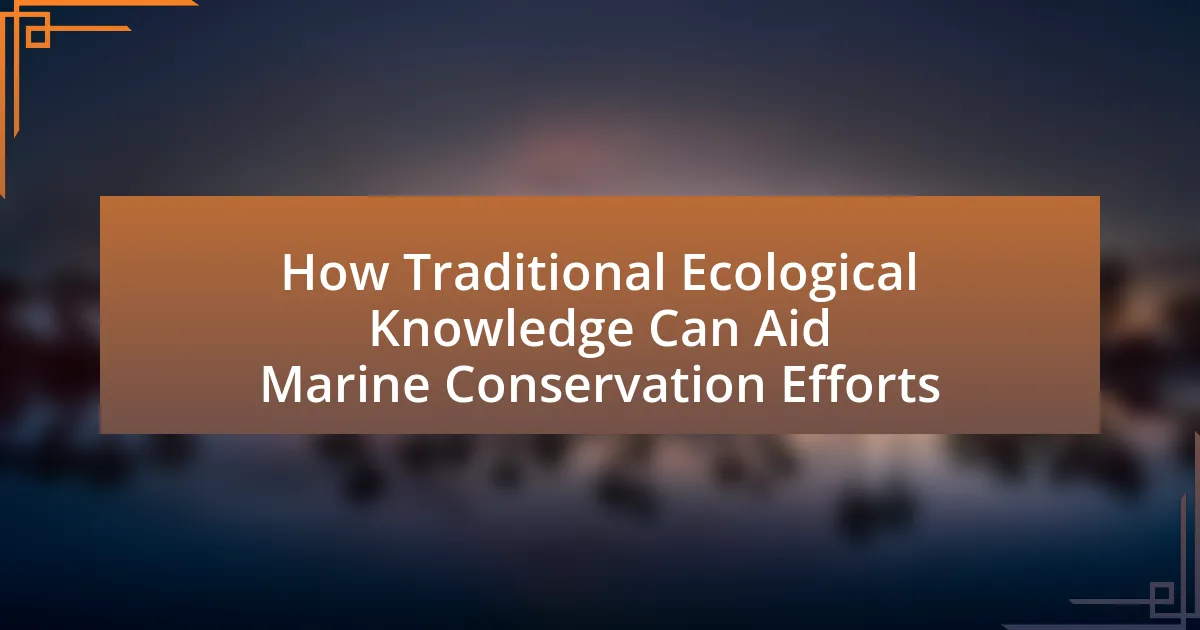Traditional Ecological Knowledge (TEK) encompasses the accumulated knowledge, practices, and beliefs of Indigenous and local communities regarding their relationship with the environment, particularly marine ecosystems. This article explores the relevance of TEK in marine conservation, highlighting its principles, unique insights, and the differences between TEK and Western scientific approaches. It discusses the integration of TEK into conservation strategies, methods for collaboration between Indigenous communities and conservationists, and successful case studies demonstrating the effectiveness of TEK in enhancing biodiversity and ecosystem health. Additionally, the article addresses challenges in utilizing TEK and offers practical steps for its implementation in marine conservation efforts.

What is Traditional Ecological Knowledge and its relevance to Marine Conservation?
Traditional Ecological Knowledge (TEK) refers to the cumulative body of knowledge, practices, and beliefs about the relationship of living beings with one another and their environment, developed by Indigenous and local communities over generations. TEK is relevant to marine conservation as it provides insights into sustainable practices, biodiversity management, and ecosystem health, often based on long-term observations and interactions with marine environments. For instance, studies have shown that Indigenous fishing practices can lead to healthier fish populations and ecosystems, as seen in the case of the Haida Nation’s management of herring stocks, which emphasizes the importance of traditional practices in maintaining marine biodiversity.
How is Traditional Ecological Knowledge defined?
Traditional Ecological Knowledge (TEK) is defined as the cumulative body of knowledge, practices, and beliefs about the relationship of living beings with one another and their environment, developed by indigenous and local communities over generations. TEK encompasses ecological insights, resource management strategies, and cultural values that inform sustainable practices and conservation efforts. This knowledge is often rooted in a deep understanding of local ecosystems, which has been validated through long-term observation and interaction with the environment, making it a valuable resource for contemporary marine conservation initiatives.
What are the key principles of Traditional Ecological Knowledge?
The key principles of Traditional Ecological Knowledge (TEK) include a deep understanding of local ecosystems, intergenerational knowledge transfer, and a holistic approach to resource management. TEK emphasizes the importance of observing and interpreting natural patterns, which allows communities to sustainably manage their environments. This knowledge is often passed down through generations, ensuring that cultural practices and ecological insights are preserved. Additionally, TEK integrates social, spiritual, and environmental dimensions, promoting a balanced relationship between humans and nature. These principles are validated by numerous studies, such as those documented in the “Journal of Environmental Management,” which highlight the effectiveness of TEK in enhancing biodiversity conservation and ecosystem resilience.
How does Traditional Ecological Knowledge differ from Western scientific approaches?
Traditional Ecological Knowledge (TEK) differs from Western scientific approaches primarily in its holistic and experiential nature. TEK is rooted in the cultural practices and historical experiences of Indigenous peoples, emphasizing a deep understanding of local ecosystems developed over generations. In contrast, Western scientific approaches often prioritize empirical data, controlled experiments, and quantitative analysis, focusing on isolating variables to understand ecological phenomena.
For example, TEK incorporates spiritual and cultural dimensions, viewing humans as an integral part of the ecosystem, while Western science typically treats humans as separate from nature. This fundamental difference influences conservation strategies; TEK often promotes sustainable practices based on long-term observations, whereas Western science may rely on short-term studies and technological interventions. The effectiveness of TEK in marine conservation is evidenced by successful community-led initiatives that have restored fish populations and habitats, demonstrating the value of integrating both knowledge systems for effective environmental management.
Why is Traditional Ecological Knowledge important for Marine Conservation?
Traditional Ecological Knowledge (TEK) is important for marine conservation because it provides valuable insights into sustainable practices and ecosystem management based on generations of experience. TEK encompasses the understanding of local marine environments, species behavior, and ecological relationships, which can enhance scientific knowledge and inform conservation strategies. For example, Indigenous communities have historically managed fisheries in ways that maintain biodiversity and ecosystem health, demonstrating the effectiveness of TEK in preserving marine resources. Studies have shown that integrating TEK with modern scientific approaches leads to more effective conservation outcomes, as evidenced by successful co-management initiatives in various marine protected areas.
What unique insights does Traditional Ecological Knowledge provide about marine ecosystems?
Traditional Ecological Knowledge (TEK) provides unique insights into marine ecosystems by integrating indigenous practices and observations that span generations. TEK emphasizes the interconnectedness of species and their habitats, highlighting the importance of biodiversity and ecosystem health. For instance, indigenous communities often possess detailed knowledge of seasonal changes, species behavior, and ecological relationships, which can inform sustainable fishing practices and habitat conservation. Research has shown that TEK can enhance marine management strategies, as evidenced by case studies where indigenous-led initiatives have led to improved fish populations and ecosystem resilience. This knowledge is crucial for addressing contemporary challenges such as climate change and overfishing, as it offers time-tested strategies for maintaining ecological balance.
How can Traditional Ecological Knowledge enhance biodiversity conservation efforts?
Traditional Ecological Knowledge (TEK) enhances biodiversity conservation efforts by integrating indigenous practices and ecological insights into modern conservation strategies. TEK provides a deep understanding of local ecosystems, species interactions, and sustainable resource management, which can lead to more effective conservation outcomes. For example, studies have shown that indigenous land management practices, such as controlled burns, can promote biodiversity and ecosystem health, as evidenced by research conducted by the Australian government, which found that areas managed by Indigenous Australians had higher biodiversity levels compared to those managed by conventional methods. By incorporating TEK, conservation initiatives can become more culturally relevant and ecologically sound, ultimately leading to improved biodiversity preservation.

How can Traditional Ecological Knowledge be integrated into Marine Conservation strategies?
Traditional Ecological Knowledge (TEK) can be integrated into Marine Conservation strategies by incorporating indigenous practices and insights into the management and protection of marine ecosystems. This integration enhances conservation efforts by utilizing local knowledge about species behavior, habitat conditions, and sustainable resource use, which has been developed over generations. For instance, studies have shown that indigenous fishing practices often align with sustainable practices, leading to healthier fish populations and ecosystems. Research published in the journal “Ecological Applications” highlights that areas managed with TEK often exhibit greater biodiversity and resilience compared to those managed solely by conventional scientific methods. This evidence supports the effectiveness of integrating TEK into marine conservation strategies, ensuring that both ecological and cultural dimensions are respected and preserved.
What are the methods for incorporating Traditional Ecological Knowledge into conservation planning?
Incorporating Traditional Ecological Knowledge (TEK) into conservation planning can be achieved through methods such as participatory mapping, collaborative research, and community engagement. Participatory mapping allows local communities to share their ecological knowledge and spatial data, which can inform conservation strategies. Collaborative research involves scientists working alongside Indigenous knowledge holders to integrate TEK with scientific data, enhancing the understanding of ecosystems. Community engagement fosters trust and ensures that conservation efforts align with local values and practices, leading to more effective management outcomes. These methods have been validated by case studies demonstrating improved biodiversity outcomes when TEK is integrated into conservation frameworks.
How can collaboration between Indigenous communities and conservationists be fostered?
Collaboration between Indigenous communities and conservationists can be fostered through the integration of Traditional Ecological Knowledge (TEK) into conservation practices. TEK provides valuable insights into sustainable resource management, as evidenced by studies showing that Indigenous-led conservation initiatives often result in higher biodiversity outcomes. For instance, research published in the journal “Nature” highlights that areas managed by Indigenous peoples have lower rates of deforestation and better conservation of marine ecosystems. Establishing partnerships that respect Indigenous rights and knowledge systems, alongside co-management agreements, can enhance mutual understanding and effectiveness in conservation efforts.
What role do community-led initiatives play in this integration?
Community-led initiatives play a crucial role in integrating Traditional Ecological Knowledge (TEK) into marine conservation efforts by fostering local engagement and stewardship. These initiatives empower communities to utilize their indigenous knowledge and practices, which are often more sustainable and contextually relevant than external approaches. For example, research has shown that communities involved in managing marine resources through TEK have demonstrated improved biodiversity outcomes and resilience against climate change impacts. This integration not only enhances conservation effectiveness but also promotes cultural preservation and social cohesion within the community.
What challenges exist in utilizing Traditional Ecological Knowledge for Marine Conservation?
Utilizing Traditional Ecological Knowledge (TEK) for marine conservation faces several challenges, including the integration of indigenous knowledge with scientific methods, potential misinterpretation of TEK by non-indigenous researchers, and issues related to intellectual property rights. The integration challenge arises because TEK often encompasses holistic and culturally specific practices that may not align with conventional scientific frameworks, leading to difficulties in collaboration. Misinterpretation can occur when researchers lack a deep understanding of the cultural context of TEK, which can result in the undervaluation or misuse of this knowledge. Additionally, concerns over intellectual property rights can hinder the sharing of TEK, as indigenous communities may fear exploitation or loss of control over their traditional practices. These challenges highlight the need for respectful and equitable partnerships between indigenous communities and conservation practitioners.
How can cultural misunderstandings hinder the application of Traditional Ecological Knowledge?
Cultural misunderstandings can significantly hinder the application of Traditional Ecological Knowledge (TEK) by creating barriers to effective communication and collaboration between Indigenous communities and external stakeholders. When external parties misinterpret or overlook the cultural context of TEK, they may fail to recognize its value and relevance, leading to the dismissal of important ecological insights. For instance, a study by Berkes (2012) highlights that misalignments in worldviews can result in the undervaluation of Indigenous practices, which are often based on centuries of observation and adaptation to local ecosystems. This disconnect can prevent the integration of TEK into marine conservation strategies, ultimately undermining efforts to achieve sustainable management of marine resources.
What are the potential conflicts between Traditional Ecological Knowledge and modern conservation policies?
Potential conflicts between Traditional Ecological Knowledge (TEK) and modern conservation policies include differing priorities, methodologies, and governance structures. TEK often emphasizes holistic, community-based approaches that prioritize local cultural practices and ecological relationships, while modern conservation policies may focus on scientific data and regulatory frameworks that can overlook indigenous perspectives. For instance, policies may impose restrictions that conflict with traditional practices, such as fishing methods or land use, leading to tensions between local communities and conservation authorities. Additionally, the lack of recognition of TEK in policy-making can result in the marginalization of indigenous voices, undermining the effectiveness of conservation efforts that could benefit from local knowledge.

What are some successful case studies of Traditional Ecological Knowledge in Marine Conservation?
Successful case studies of Traditional Ecological Knowledge (TEK) in marine conservation include the use of indigenous fishing practices in the Torres Strait Islands, where local knowledge has led to sustainable management of marine resources, resulting in healthier fish populations and ecosystems. Another example is the integration of TEK in the management of the Great Barrier Reef, where Aboriginal and Torres Strait Islander peoples have contributed to conservation strategies that respect cultural practices while enhancing biodiversity. Additionally, the use of TEK in the restoration of the coastal ecosystems in Hawaii has demonstrated effective approaches to managing invasive species and protecting native marine life, showcasing the value of indigenous knowledge in contemporary conservation efforts.
What examples demonstrate effective use of Traditional Ecological Knowledge in marine settings?
Effective use of Traditional Ecological Knowledge (TEK) in marine settings is exemplified by the integration of indigenous fishing practices in the management of fisheries, such as the use of seasonal closures and specific harvesting techniques. For instance, the Haida Nation in British Columbia employs TEK to inform sustainable harvesting of herring, which has led to the recovery of this critical species. Additionally, the use of TEK by the Maori in New Zealand has been instrumental in the restoration of marine ecosystems through the establishment of marine protected areas, reflecting a deep understanding of local biodiversity and ecological relationships. These examples demonstrate that TEK not only enhances conservation efforts but also supports the resilience of marine environments.
How have Indigenous practices contributed to the restoration of marine habitats?
Indigenous practices have significantly contributed to the restoration of marine habitats through the application of Traditional Ecological Knowledge (TEK), which emphasizes sustainable resource management and ecosystem health. For instance, Indigenous communities often employ practices such as rotational fishing, which allows fish populations to recover, and the use of marine protected areas, which help preserve biodiversity. Research indicates that areas managed by Indigenous peoples often exhibit higher levels of biodiversity and resilience compared to those managed by conventional methods. A study published in the journal “Nature” found that Indigenous-led conservation initiatives can lead to improved ecological outcomes, demonstrating the effectiveness of integrating TEK into marine conservation strategies.
What lessons can be learned from these successful case studies?
Successful case studies in marine conservation demonstrate that integrating Traditional Ecological Knowledge (TEK) with scientific approaches enhances conservation outcomes. For instance, the collaboration between Indigenous communities and marine scientists in the Great Barrier Reef has led to improved biodiversity management, showcasing that local knowledge can inform effective practices. Additionally, the case of the Haida Nation in British Columbia illustrates that TEK can guide sustainable fishing practices, resulting in healthier fish populations and ecosystems. These examples validate that leveraging TEK not only respects cultural heritage but also provides practical solutions to contemporary environmental challenges.
How can stakeholders support the use of Traditional Ecological Knowledge in Marine Conservation?
Stakeholders can support the use of Traditional Ecological Knowledge (TEK) in marine conservation by actively collaborating with Indigenous communities to integrate their insights into management practices. This collaboration can enhance biodiversity conservation efforts, as evidenced by studies showing that areas managed with TEK often exhibit higher ecological resilience. For instance, research published in the journal “Ecological Applications” highlights that Indigenous-led marine management in Australia has led to improved fish populations and habitat health. By recognizing and valuing TEK, stakeholders can create policies that incorporate these traditional practices, ensuring sustainable marine resource use and fostering community engagement.
What best practices can be adopted to ensure respectful collaboration with Indigenous communities?
To ensure respectful collaboration with Indigenous communities, it is essential to prioritize meaningful engagement and mutual respect. This involves actively listening to Indigenous voices, recognizing their rights and sovereignty, and integrating Traditional Ecological Knowledge (TEK) into conservation efforts. Research indicates that TEK provides valuable insights into sustainable practices and biodiversity management, as demonstrated in studies like “Indigenous Knowledge and Conservation” by Berkes et al., which highlights the effectiveness of TEK in enhancing marine conservation outcomes. Additionally, establishing long-term partnerships based on trust and transparency fosters a collaborative environment that respects Indigenous cultural values and practices.
How can education and awareness programs promote the value of Traditional Ecological Knowledge?
Education and awareness programs can promote the value of Traditional Ecological Knowledge (TEK) by integrating indigenous practices and perspectives into formal curricula and community outreach initiatives. These programs can enhance understanding of sustainable practices that have been developed over generations, thereby fostering respect for local ecosystems. For instance, research indicates that TEK contributes to biodiversity conservation and resource management, as seen in the work of Berkes et al. (2000), which highlights the effectiveness of indigenous knowledge in managing marine resources sustainably. By educating communities about the benefits and applications of TEK, these programs can empower individuals to incorporate traditional practices into modern conservation efforts, ultimately leading to more effective marine conservation strategies.
What practical steps can be taken to implement Traditional Ecological Knowledge in Marine Conservation efforts?
To implement Traditional Ecological Knowledge (TEK) in marine conservation efforts, stakeholders should actively engage Indigenous communities in decision-making processes. This engagement can include co-management agreements that recognize Indigenous rights and incorporate their knowledge systems into conservation strategies. Research shows that integrating TEK leads to more effective management of marine resources, as evidenced by case studies in Australia and Canada where Indigenous practices have improved biodiversity outcomes. Additionally, training programs can be established to educate conservation practitioners about TEK, fostering mutual respect and understanding. These steps ensure that TEK is not only acknowledged but also effectively utilized in marine conservation initiatives.
